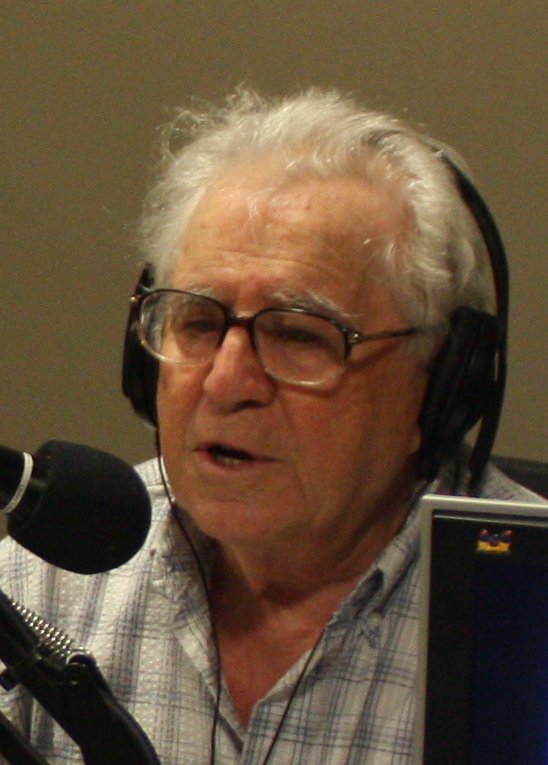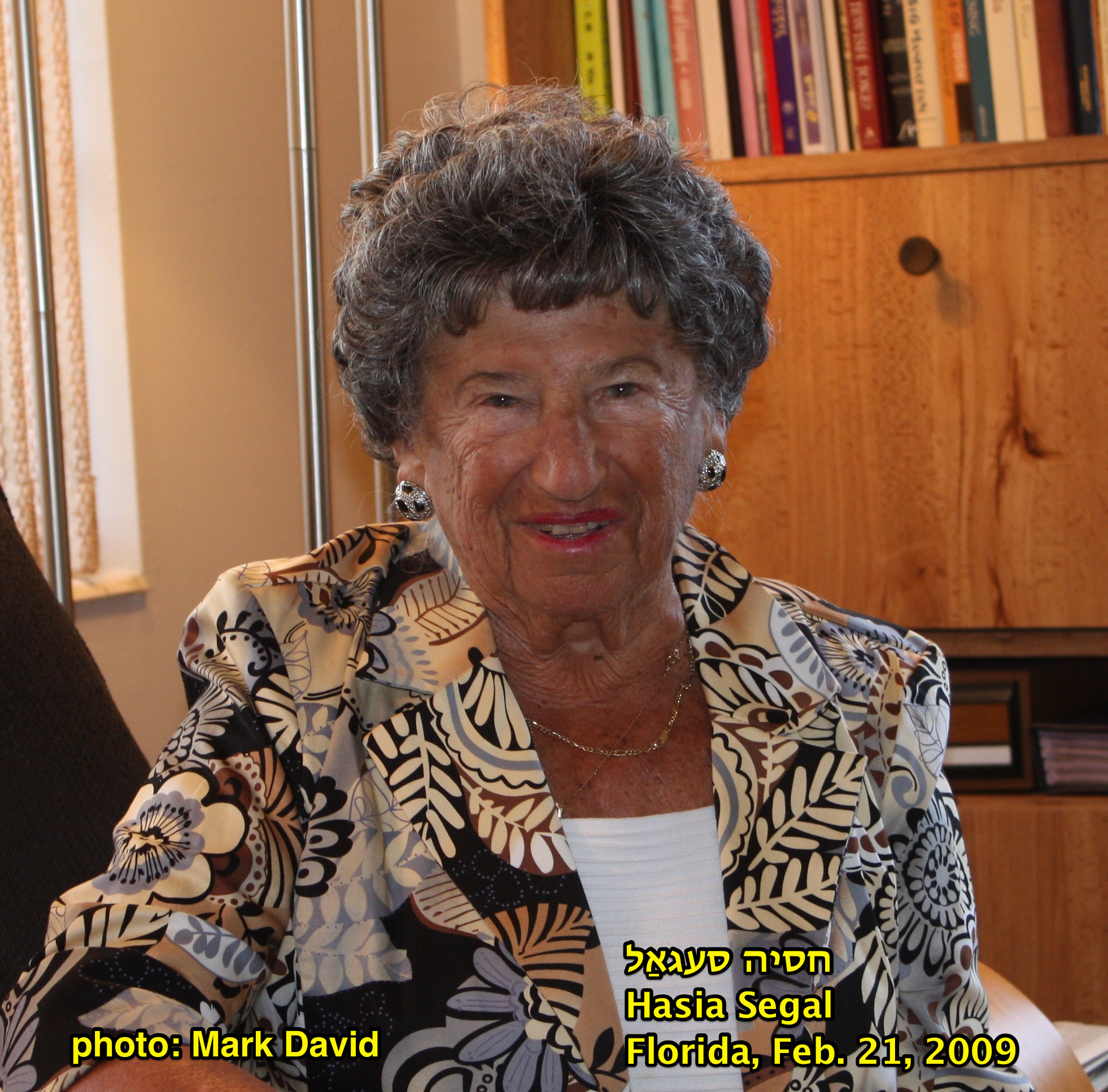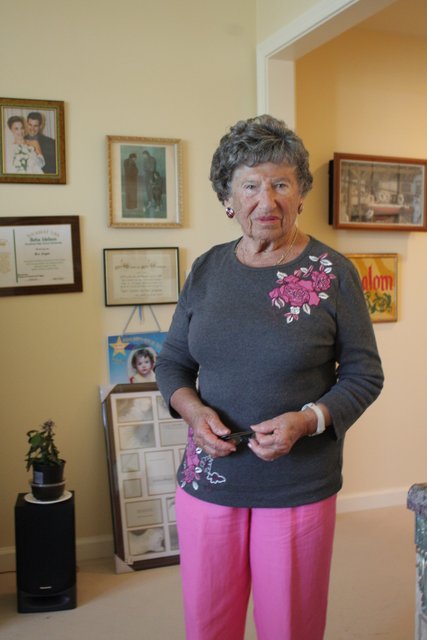Harvard's Sara Feldman on the Yiddish Voice, Weds August 14 2019

|
(archived show here)
This week's Yiddish Voice, Wednesday August 14 2019 at 7:30 PM, will air an interview with Harvard's Yiddish teacher Sara Feldman, interviewed by Sholem Beinfeld. Sara Feldman is the Preceptor in Yiddish at Harvard University. She earned her Ph.D. from the University of Michigan in Near Eastern Studies in 2014. Feldman teaches Yiddish language at the beginning, intermediate and advanced levels. Sholem Beinfeld is Professor Emeritus of History at Washington University in St. Louis, and is Co-Editor-in-Chief of the Comprehensive Yiddish-English Dictionary (Indiana University Press).
Gilles Rozier from Paris Medem Yiddish Scene on the Yiddish Voice, Weds July 24 2019
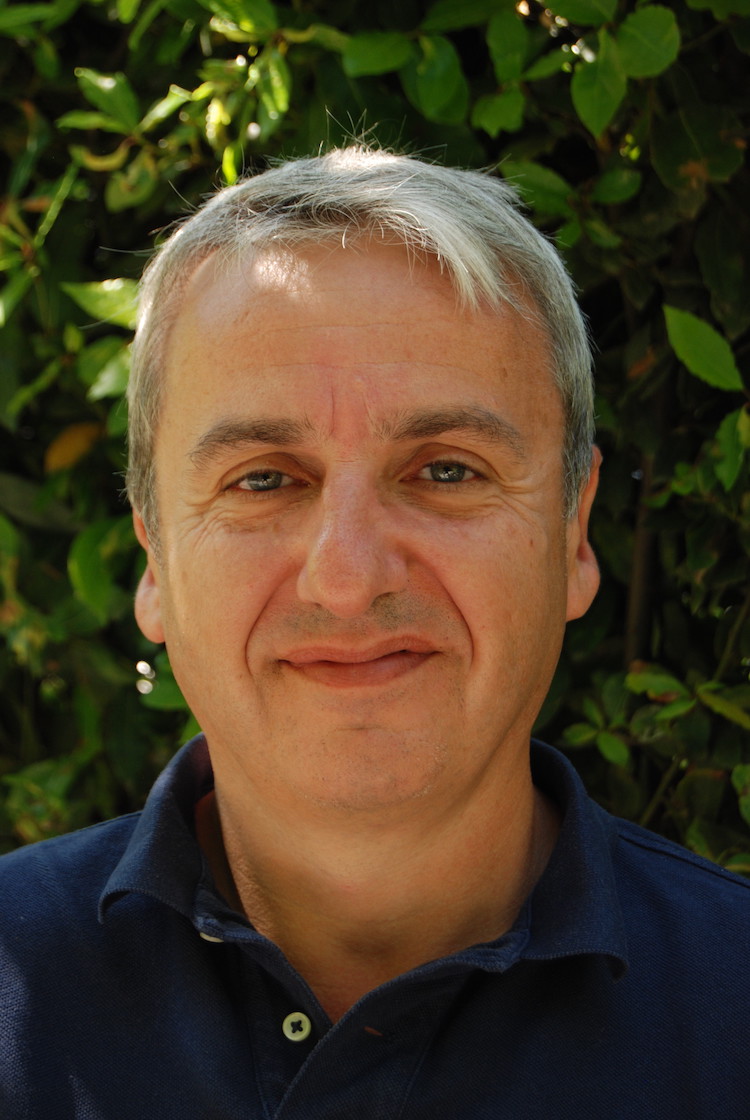
Photo: © Annick Prime-Margules אניק פּרים מרגלית |
(archived show here)
The Yiddish Voice concludes its series of interviews with Yiddish activitsts at the Paris Yiddish Center-Medem Library with an interview with Gilles Rozier, to air in Boston on WUNR 1600-AM on Wednesday July 24 2019 at 7:30 PM and live-streamed via yv.org.
Gilles Rozier was born in France in 1963. He began to learn Yiddish in 1987. From 1994 until 2014 he served as Director of the Paris Yiddish-Center/Medem Library. He wrote his Doctoral Dissertation about the Yiddish writer Moyshe Broderzon. He is also a translator from Yiddish, Hebrew, English, and French. In 2016, he and Anne-Sophe Dreyfus created "Les Editions de l’Antilope", a French-language publisher devoted to Jewish literature, which has now published 20 books, either in translation from Yiddish, Hebrew, English, and Polish, or originally written in French.
Other interviewees in this series on the Paris Medem Yiddish Scene have been: Ri J. (Reyze) Turner, whose interview was aired on June 12 2019, and Yitskhok Niborski, whose interview was aired on June 26 2019.
The interviews are conducted by Sholem Beinfeld, He is Professor Emeritus of History at Washington University in St. Louis, and is perhaps best known as Co-Editor-in-Chief of the "Comprehensive Yiddish-English Dictionary" ("Arumnemik Yidish-English Verterbukh"), as well as a translator of Yiddish texts and creator of new subtitles for classic Yiddish movies. The Dictionary is based on the "Yiddish-French Dictionary" edited by Yitskhok Niborski and published by the Medem Library/Paris Yiddish Center. Sholem's connection with the Medem Library goes back many decades, beginning with his Fulbright Fellowship in Paris as a graduate student.
Yitskhok Niborski from Paris Medem Yiddish Scene on the Yiddish Voice, Weds June 26 2019
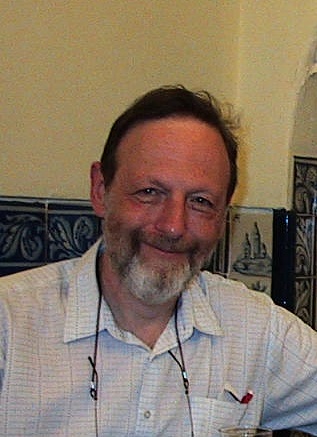
|
(archived show here)
The Yiddish Voice continues its series of interviews with Yiddish activitsts at the Paris Yiddish Center-Medem Library on Wednesday June 26 2019 at 7:30 PM with an interview with Yitskhok Niborski, airing in Boston on WUNR 1600-AM Wednesdays at 7:30 PM and live-streamed via yv.org.
Yitskhok Niborski was born in Buenos Aires in 1947 and raised in a Yiddishist, secular family. He attended the Yiddish schools that then thrived in Buenos Aires and the Yiddish teachers' training academy (Lerer-Seminar) with specialization in Yiddish literature. He moved to Paris in 1979 to take up a position as Director of the Medem Library while also teaching at the prestigious Ecole Nationale des Etudes Orientales. He remeained at the head of the Medem Library for over thirty years, helping to turn the Medem Library-Paris Yiddish Center into one of the most active Yiddish institutions in the world. He has devoted his entire adult life to Yiddish education: in elementary schools, in classes for adults, and in universities. He participated in publishing several Yiddish dictionaries and textbooks, nobably the Verterbukh fun Loshn-koydesh shtamike verter in Yidish (first edition 1997) and the Dictionnaire Yiddish-Français (Yiddish-French Dictionary) (2002), both published by the Medem Library-Paris Yiddish Center. He has also written and published over twenty poems in Yiddish.
Other interviewees in this series are Ri J. (Reyze) Turner, whose interview was aired on June 12 2019, and Gilles Rozier, whose interview will be aired on an upcoming program, to be announced.
Ri J. Turner from the Paris-Medem Yiddish Scene on the Yiddish Voice on Weds June 12 2019
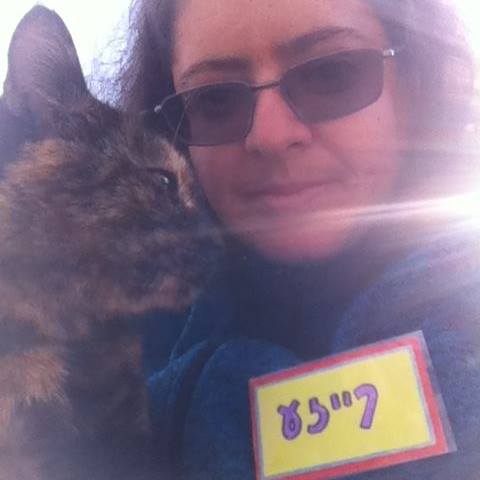
|
(archived show here)
The Yiddish Voice will begin a series of interviews with activists on the Yiddish scene around the Paris Yiddish Center-Medem Library starting Wednesday June 12 2019 at 7:30 PM with an interview with Ri J. (Reyze) Turner. All interviews will air in the coming weeks on the Yiddish Voice radio show in Boston on WUNR 1600-AM Wednesdays at 7:30 PM and live-streamed via yv.org.
Ri J. Turner is a translator and Yiddish language teacher at the Paris Yiddish Center-Medem Library, as well as an MA candidate in Yiddish Studies at the Hebrew University of Jerusalem. She is a three-time alumna of the Uriel Weinreich Summer Program at YIVO in New York, and was a Translation Fellow of the Yiddish Book Center in Amherst, MA, in 2014 and 2018 and the National Endowment for the Arts and the PEN/Heim Fund in 2018. Her translations and original writing have appeared in In Geveb, Pakn Treger, the Forverts, Afn Shvel, and elsewhere.
Interviews in the series will continue in following weeks with Yitskhok Niborski and Gilles Rozier, with announcements to follow.
The interviews are conducted by Sholem Beinfeld, He is Professor Emeritus of History at Washington University in St. Louis, and is perhaps best known as Co-Editor-in-Chief of the Comprehensive Yiddish-English Dictionary (Arumnemik Yidish-English Verterbukh), as well as a translator of Yiddish texts and creator of new subtitles for classic Yiddish movies. The Dictionary is based on the Yiddish-French Dictionary edited by Yitskhok Niborski and published by the Medem Library/Paris Yiddish Center. Sholem's connection with the Medem Library goes back many decades, beginning with his Fulbright Fellowship in Paris as a graduate student.
Yiddish Play "Kraft" ("Power") Director on the Yiddish Voice on Weds June 5 2019

|
(archived show here)
This Wednesday's Yiddish Voice, June 5 2019 at 7:30 PM in Boston, will have an interview with Yiddish theater activist and researcher Jana Mazurkiewicz-Meisarosh (יאַנאַ מאַזורקעוויטש-מייסאַראָש), who is producing and directing the Yiddish-language play Kraft (English translation: Power). Although the play is in Yiddish (with English supertitles), it is not your typical Yiddish-theater fare, but more of a modernistic small-theater experience presented as part of the San Diego International Fringe Festival. The blurb for the play says, "Power is a Yiddish play about civilization and what fuels it." It takes place in a 20th century large American city like New York and concerns American political issues. It was written by a little-known writer, Leah Hoffman, and this Thursday (June 6 2019)'s performance will in fact be its "world premier". Additional info is on Facebook here, and also: to RSVP or ask questions, please e-mail [email protected] or call 619-719-1776.
Jana Mazurkiewicz-Meisarosh is a Ph.D. candidate in the Slavic Department of University of Michigan, Ann Arbor. Her dissertation research is on Yiddish Theater in Communist Warsaw. Originally from Poland, Jana holds a Master of Arts degree in Polish Philology and Jewish Studies from the University of Wrocław. Jana combines her Yiddish academic research with theater and community activism. Professionally experienced in acting, directing, and playwriting, she wrote the play "Hiltserne Milkhomes" (“Wooden Wars”) in Yiddish and produced it for stage in Ann Arbor in 2013-2014. In October 2017, she moved to San Diego and launched the Yiddish Arts and Academics Association of North America - YAAANA (website: yaaana.org), which has as its goal, Jana has said, "to make Yiddish culture hip, modern, and interesting". Jana is interested in Yiddish both as a stage language and as a means of exploring the current state of Polish-Jewish relationships.
Schaechter Siblings Gitl and Binyumen Talk Song on the Yiddish Voice on Weds Apr 10 2019

|
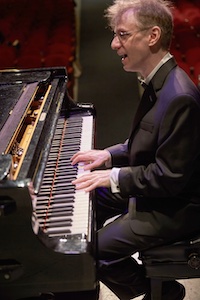
|
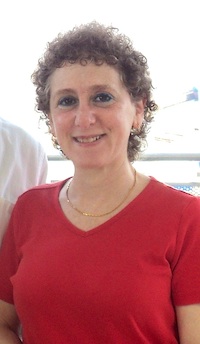
|
(archived show here)
Binyumin Schaechter and Gitl Schaechter-Viswanath will appear on this week's Yiddish Voice, Wednesday Apr 10 2019 at 7:30 PM, discussing (in Yiddish) the Jewish People's Philharmonic Chorus (JPPC - thejppc.org), of which Binyumin is the conductor and his sister Gitl is one of the singers. They discuss the history of the JPPC and their many years of involvement with it, and also talk about the upcoming Spring 2019 Gala Concert, Yiddish Flavors of Love: A Musical Celebration, set to take place Sunday June 16, 2019, at 3:00 PM at Merkin Concert Hall in New York City. Some musical excerpts of the Choir's performance, including from recent rehearsals for their upcoming performance, will also be heard. For more information about the JPPC and their concert, visit their web site here: https://www.thejppc.org/concerts.html
Rukhl Schaechter, Michael Wex on the Yiddish Voice Weds Mar 13 2019, 7:30 to 8:30 pm
(archived show here)
Two very special guests will appear on this week's Yiddish Voice, Wednesday Mar 13 2019 at 7:30 PM:
- Rukhl Schaechter, editor of the Yiddish Forward (Forverts), speaks with regular cohost Sholem Beinfeld about the latest developments at the newspaper, including the plan to go digital-only and discontinue the printed version begun in 1897.
- Michael Wex, renowned author and humorist, joins regular cohosts Leah Leavitt, Sholem Beinfeld, and Mark David for a semi-serious discussion about Jewish humor and Purim.
Kalman Weiser, Yiddish Scholar, Interviewed on the Yiddish Voice, WUNR 1600 AM/Boston – Wednesday, Feb 6, 2019, 7:30 to 8:30 pm
(archived show here)
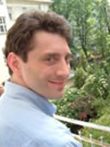
Keith (Kalman) Weiser |
|
|
On Wednesday Feb 6 2019 at 7:30 PM the Yiddish Voice will feature an interview, in Yiddish, with Kalman Weiser, discussing the late Yiddish language scholars Solomon (Shloyme) Birnbaum and Noyekh Prilutski.
Professor Keith (Kalman) Weiser is the Silber Family Professor of Modern Jewish Studies at York University, Toronto. His research focuses in the area of modern Jewish history and culture, specifically about language issues in Jewish life. His publications include Jewish People, Yiddish Nation: Noah Prylucki and the Folkists in Poland (University of Toronto Press, 2011) and the introduction to the second edition of Shloyme Birnbaum's Yiddish: A Survey and a Grammar (University of Toronto Press, 2016).
The interview is conducted by Sholem Beinfeld, a regular contributor to the Yiddish Voice, co-Editor in Chief of the Comprehensive Yiddish-English Dictionary, and Professor of History, Emeritus, Washington University, St. Louis. Dr. Beinfeld served as principal consultant on the film "Partisans of Vilna" (credited as Solon Beinfeld). He was senior consultant and historian to the Kovno Ghetto Exhibition project of the United States Holocaust Memorial Museum and consultant to the Museum on the Ghetto archive holdings in the Lithuanian State Archives in Vilnius.
The Yiddish Voice: Radio Program in Memory of Myer Loketch Z”L
WUNR 1600 AM/Boston – Wednesday, Dec 19, 2018, 7:30 to 8:30 pm
(archived show here)
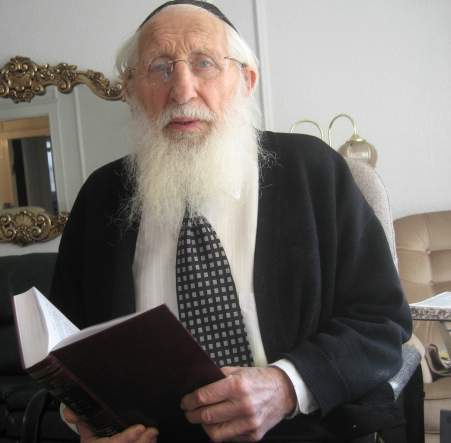
Myer Loketch at his home in Brookline, Hanukkah, 2006, at a taping for The Yiddish Voice |
The Boston Yiddish-language radio show The Yiddish Voice will broadcast a program in memory of Rabbi Myer Loketch, following shloyshim, thirty days of mourning, on Wednesday, December 19, 2018, at 7:30 pm on WUNR 1600 AM in Boston.
Loketch was a frequent and beloved guest speaker on the Yiddish Voice during the 2000's. His presentations on the Halochos and Minhogim of various Jewish holidays continue to be re-aired and enjoyed by listeners to this day.
The program will include memorial tributes by Loketch's son Rabbi Dov Loketch of Detroit and Rabbi Shayke Lerner of Chabbad Center of Brookline as well highlights of Myer Loketch's radio presentations.
[In Yiddish:]
דאָס ייִדישע קול: שלושים-פּראָגראַם אין אָנדענק פֿון מאיר לאָקעטש ז"ל
WUNR 1600 AM/Boston – מיטװאָך דעם 19טן דעצ׳ 2018 7:30 ביז 8:30 אין אָװנט
די באָסטאָנער ראַדיאָ-פּראָגראַם דאָס ייִדישע קול װעט טראַנסמיטירן אַן אוידיציע אין אָנדענק פֿון רבֿ מאיר לאָקעטש ז״ל, נאָך זײַנע שלושים, מיטװאָך דעם 19טן דעצעמבער 2018, 7:30 אין אָװנט אױף WUNR 1600-AM אין באָסטאָן. ר׳ מאיר איז אָפֿט מאָל אויפֿגעטראָטן ווי אַ באַליבטער גאַסט בײַם ייִדישן קול אין די 2000ער יאָרן. זײַנע לעקציעס וועגן הלכות און מינהגים פֿון פֿאַרשיידענע ייִדישע יום-טובֿים גיט מען איבער עד היום אויף דער ראַדיאָ, אַז די צוהערער קענען ווײַטער הערן און הנאה האָבן דערפֿון. אין דער פּראָגראַם צו די שלושים וועט אים מספּד זײַן זײַן זון רבֿ דאבֿ-בער לאָקעטש פֿון דעטרויט, אים צו לאַנגע יאָר, און רבֿ שײַקע לערנער פֿון חב״ד-צענטער פֿון ברוקלײַן. מע וועט אויך איבערגעבן הויכפּונקטן פֿון זײַנע רעקאָרדירונגען וואָס מען האָט פֿריִער געהערט אױף דער פּראָגראָם דאָס ייִדישע קול.
Background information on Myer Loketch:
Rabbi Myer Loketch was born in Warsaw in 1922 and lived there until the German invasion in 1939. He narrowly escaped to Russia during the war, and was initially imprisoned in Siberia but later released to serve in a Polish military unit that helped to liberate Warsaw. Having lost his entire family during the war, he settled in Lodz, where he married Itta (Irene) Lessman. Their young family emigrated to Boston in 1952, where Reb Myer served for decades as a highly esteemed clergy member at various shuls, notably, the Blue Hill Avenue shul in Roxbury and the Young Israel of Brookline. He taught and otherwise served countless individuals and was widely renowned as an excellent Baal Korei and Baal Tfila. He retired and moved to Detroit in 2009. He died in Detroit on November 12 2018, survived by his wife Irene, five children, and numerous grandchildren and great-grandchildren.
External related links:
- Hebrew Memorial Chapel (Detroit) Obituary for RABBI MYER L. LOKETCH March 22, 1922 - November 12, 2018
- Young Israel of Brookline Home Page, with information about a planned Memorial Event and Siyum for Rev. Myer Loketch zt"l, Sunday, December 16th, 8:00 PM
Anna Shternshis on "Yiddish Glory" and Soviet Jewry, a 12 August 1952 Memorial
(archived show here)
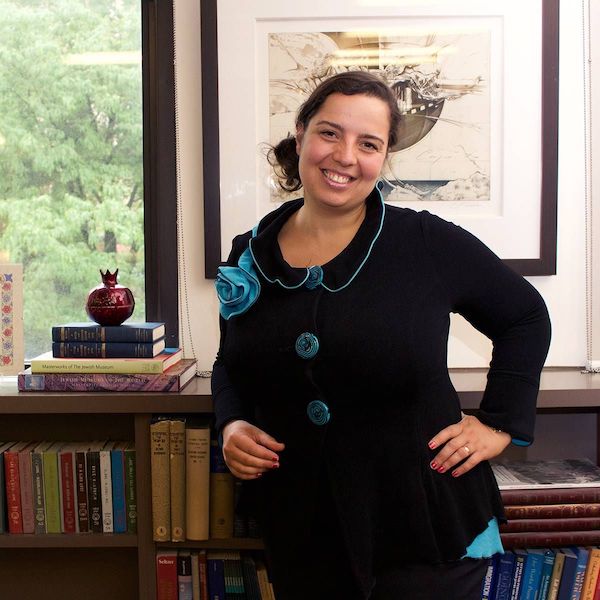
Anna Shternshis |
|
On Wednesday August 8 2018 at 7:30 PM, the Yiddish Voice will feature an interview, in Yiddish, with Anna Shternshis, Associate Professor of Yiddish Studies at University of Toronto. The interview is presented in memory of 12 August 1952, when thirteen Jews were executed in Lubyanka Prison in Moscow, five of them Yiddish writers Peretz Markish, Dovid Hofstein, Itzik Feffer, Leib Kvitko, and Dovid Bergelson.
Dr. Shternshis was executive producer of the recently released CD Yiddish Glory: The Lost Songs of World War II, based on her research on Moisei Beregovsky's archive, which the Soviet authorities confiscated in 1947, arresting Beregovsky a short time later. The Yiddish Glory CD contains songs written in Yiddish by Jews in the Soviet Union during World War II. The CD's songs have music thoughtfully composed by Shternshis's collaborator Psoy Korolenko. There is a large ensemble of talented musicians and singers on the CD as well as high quality English and Russian translations. Dr. Shternsis and Psoy Korolenko have recently toured extensively in the past year in support of the CD, bringing these once-lost songs to an ever widening audience.
For more information on the Yiddish Glory CD: https://www.sixdegreesrecords.com/yiddishglory/
Anna Shternshis is also author of two books, Soviet and Kosher: Jewish Popular Culture in the Soviet Union, 1923 - 1939 (Indiana University Press, 2006) and When Sonia Met Boris: an Oral History of Jewish Life under Stalin (Oxford University Press, 2017).
The interview is conducted by Sholem Beinfeld, a regular contributor to the Yiddish Voice, co-Editor in Chief of the Comprehensive Yiddish-English Dictionary, and Professor of History, Emeritus, Washington University, St. Louis. Dr. Beinfeld served as principal consultant on the film "Partisans of Vilna" (credited as Solon Beinfeld). He was senior consultant and historian to the Kovno Ghetto Exhibition project of the United States Holocaust Memorial Museum and consultant to the Museum on the Ghetto archive holdings in the Lithuanian State Archives in Vilnius.
Debra Caplan's "Yiddish Empire" Discussed on the Yiddish Voice Wednesday, June 27, 2018
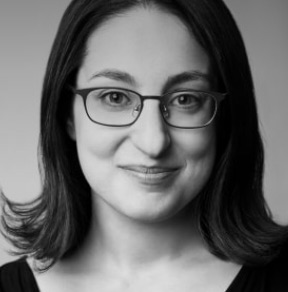
Author: Debra Caplan |
|
On Wednesday June 27 2018 at 7:30 PM the Yiddish Voice will feature an interview, in Yiddish, with Debra Caplan, author of Yiddish Empire: The Vilna Troupe, Jewish Theater, and the Art of Itinerancy (University of Michigan Press, 2018), which presents the previously little-known history of the once world-renowned Yiddish acting group known as the Vilna Troupe, which existed from 1915 to 1936. From the publisher's description at their website:
Yiddish Empire tells the story of how a group of itinerant Jewish performers became the interwar equivalent of a viral sensation, providing a missing chapter in the history of the modern stage. During World War I, a motley group of teenaged amateurs, impoverished war refugees, and out-of-work Russian actors banded together to revolutionize the Yiddish stage. Achieving a most unlikely success through their productions, the Vilna Troupe (1915-36) would eventually go on to earn the attention of theatergoers around the world. Advancements in modern transportation allowed Yiddish theater artists to reach global audiences, traversing not only cities and districts but also countries and continents. The Vilna Troupe routinely performed in major venues that had never before allowed Jews, let alone Yiddish, upon their stages, and operated across a vast territory, a strategy that enabled them to attract unusually diverse audiences to the Yiddish stage and a precursor to the organizational structures and travel patterns that we see now in contemporary theater. (https://www.press.umich.edu/9533320/yiddish_empire)
Debra Caplan is Assistant Professor of Theatre at Baruch College in Manhattan, where she specializes in Yiddish theater and drama, among other areas. Professor Caplan is a co-founder and co-chair of the Digital Yiddish Theater Project, a web resource on the history of the Yiddish stage (yiddishstage.org). Before joining Baruch College, Caplan earned her PhD at Harvard under Professor Ruth Wisse in 2013, where her research on the Yiddish theater generally and on the Vilna Troupe in particular would provide a strong base for her later book. During this period Yiddish Voice listeners fondly recall her presence in the Boston community, during which she taught and lectured on Yiddish, Yiddish Theater, and related topics in various academic and social contexts, performed music and theatrical works, and produced and directed theater. She appeared on the Yiddish Voice in 2009 to discuss her then major project, co-directing and producing, somewhat miraculously, a revival of Goldfaden's Yiddish operetta Shulamis at Harvard's Agassiz Theater, with dialogue in English translation by Nahma Sandrow, with all songs performed in their original Yiddish.
Yahrtzeit Memorial Program for Iosif Lakhman on Weds Jun 20 2018
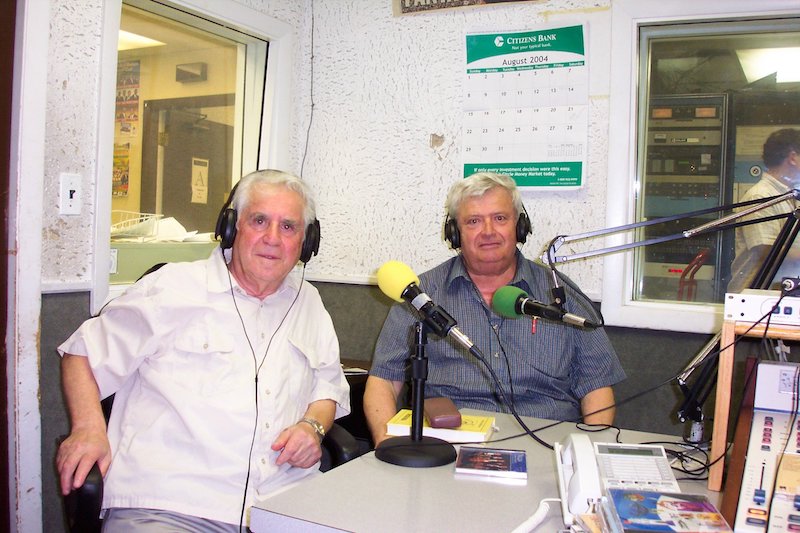
Photo: Iosif Lakhman with Misha Khazin on the Yiddish Voice, WUNR Studios, Boston, August, 2004
This Wednesday's broadcast of The Yiddish Voice (WUNR 1600-AM, Boston), June 20, 2018, at 7:30 PM (EDT), will observe the Yahrtzeit -- the one-year anniversary of the death -- of Iosif Lakhman, the late beloved co-host of the Yiddish Voice radio program, who passed away on June 6, 2017, at the age of 96, with a special re-airing of last year's special "Shloyshim" memorial program. Participants included Misha Khazin, Dobe Ressler, Leah Leavitt, Dovid Braun, Sholem Beinfeld, and Mark David. Excerpts of an oral history interview with Lakhman, as well as highlights of several of his many radio appearances on the Yiddish Voice, were also presented.
Older, related announcements since the passing of Iosif Lakhman:
- Iosif Lakhman Shloyshim Memorial on the Yiddish Voice
The Yiddish Voice presented a Shloyshim Memorial radio program in memory of its late co-host Iosif Lakhman on Wednesday, July 12, 2017 at 7:30 PM on WUNR 7:30 PM.
(archived show here)
Borukh Dayen Emes....
Announcement date: June 9, 2017:
Iosif Lakhman z"l 1921 - 2017
Photo: Iosif Lakhman on the Yiddish Voice, WUNR Studios, Boston, Aug. 8, 2012The "Yiddish Voice" radio program in Boston is extremely saddened to announce that our beloved co-host, Iosif Lakhman, died this past Tuesday morning, June 6, 2017.
Iosif Lakhman, known in Yiddish as Yosef, or often by his nickname Yoske, was born in the Ukrainian shtetl Dinevits in 1921. His father, who had been a Hebrew teacher before the Russian Revolution, later had to make his living on a collective farm. Iosif served in the Soviet Army during World War II, earning the distinction of being one of the liberators of the city of Daugavpils, Latvia, in July 1944.
As a child, he loved Yiddish literature, poetry, and theater. In school, he was given the honor of reciting his own Yiddish poem in front of the great Soviet-Yiddish poet Itsik Feffer. He also once wrote to the great Soviet-Yiddish actor Shloyme Mikhoels, hoping to get involved with the state-sponsored Yiddish theater. Mikhoels answered him, inviting him to join. However, Iosif's father did not want this for his son, and tore the letter up.
After the war, Iosif earned his PhD in economics and had a successful career as an economist in Moscow. When the Stalinist repression of Yiddish language and letters began to loosen in the early 1960's, he participated actively in publications and events, contributing occasionally to Sovetish Heymland, the principal Yiddish literary journal of the Soviet Union.
By the early 1990's Iosif had left Russia and settled in Boston. He attended Bunker Hill Community College, studying English and other subjects. He began a long association of collaboration with his friend, the writer Misha Khazin. They frequently contributed, both together and individually, to various Russian, Yiddish, and English-language publications, most often on matters of Jewish life, politics, and literature.
Iosif began serving as co-host of the "Yiddish Voice" in 2004. For several years, he regularly joined host Mark David, as well as guests, for live Yiddish readings, presentations, and interviews in the studios of WUNR 1600-AM in Boston. In recent years, despite limitations due to health issues and advancing age, he remained actively involved with the radio show until practically his last days.
Besides the Yiddish Voice, Iosif was also quite active in other Yiddish language and culture activities in Boston, serving for years as Yiddish teacher at the Workmen's Circle in Brookline and as a member of the Yiddish Committee of the Boston Workmen's Circle. Over years he mentored and collaborated with many much younger and quite serious Yiddish activists in Boston, notably the Klezmer/Yiddish musician Dena (Dobe) Ressler and the Yiddish translator and teacher Lillian (Leye) Shporer-Leavitt.
Iosif is survived by his wife Ina Lakhman (Diakova), his daughter Zina Lamm, and his granddaughter Anna Lamm.
The funeral is to be held on Sunday, June 11, at 12:30 PM at Stanetsky Memorial Chapel, 1668 Beacon Street, Brookline, MA 02445.
A Shloyshim (memorial) program is planned for the Yiddish Voice and will be announced in the coming weeks.
For the Yiddish Voice:
Mark David, Host/Producer
Dovid Braun, writer and co-host
External related links:
- In Memory of a Friend -- in Russian -- obituary in online Russian newspaper "Мы здесь" ("We Are Here") written by Misha Khazin.
- Iosif Lakhman, Yiddish Cultural Activist in Boston, Has Died -- in Yiddish -- obituary in the Forverts written by Misha Khazin.
- Iosif Lakhman's Oral History -- in Yiddish -- Iosif Lakhman's 2013 interview for the Yiddish Book Center's Wexler Oral History project. (Note: Aaron Lansky, founder and president of the Yiddish Book Center, conducted this interview with Lakhman.)
- Dear Dad -- in Russian -- a touching open letter from Iosif Lakhman's daughter Zina Lamm, looking back on their lives together. The letter was published on the web site of the Massachusetts Club of Russian-Speaking Scientists, of which Lakhman had been an active member until the very end.
Zalmen Mlotek: Fiddler on the Roof in Yiddish
(archived show here)Interview with Zalmen Mlotek discussing the forthcoming
production Fiddler on the Roof in Yiddish (Fidler afn Dakh)
by the National Yiddish Theater - Folksbiene. Previews begin July
4, 2018. Info: http://nytf.org
Twitter: @folksbiene
Miriam Hoffman's A Breed Apart Discussed on The Yiddish Voice Weds May 16 2018
(archived show here)
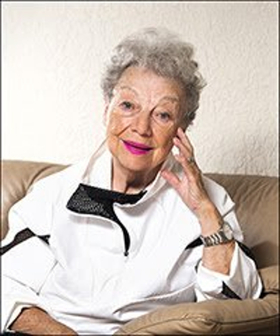
Author: Miriam Hoffman |
|
An interview (in Yiddish) with writer Miriam Hoffman will be heard on Boston radio's The Yiddish Voice on WUNR 1600-AM Wednesday May 16 2018 at 7:30 PM (Eastern). In the interview Hoffman discusses her recently published memoir A Breed Apart: Reflections of a Young Refugee (Yiddishkayt Press, 2017). The interview, like the book, follows her fascinating life, from childhood in Sibera and Germany through adulthood in New York, raising a family in Yiddishist society in New York and finding success as a columnist and feature writer for the Yiddish Forward Newspaper (Forverts), as a Yiddish educator at Columbia University, and as a playwright, including cofounding the Joseph Papp Yiddish Theatre.
The interview is conducted by Sholem Beinfeld, a regular contributor to the Yiddish Voice, co-Editor in Chief of the Comprehensive Yiddish-English Dictionary, and Professor of History, Emeritus, Washington University, St. Louis.
Dovid Fishman Discusses The Book Smugglers on the Yiddish Voice Weds May 2 2018
(archived show here)
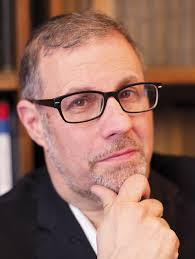
Dr. David E. Fishman |
|
On Wednesday May 2 2018 at 7:30 PM the Yiddish Voice will feature an interview, in Yiddish, with Dr. David E. Fishman, author of The Book Smugglers: Partisans, Poets, and the Race to Save Jewish Treasures from the Nazis (ForeEdge, 2017), winner of the National Jewish Book Award in 2017 for a work on the Holocaust.
David E. Fishman is professor of Jewish history at the Jewish Theological Seminary of New York. Dr. Fishman is the author of numerous books and articles on the history and culture of East European Jewry. Previous monographs include Russia's First Modern Jews (New York University Press, 1996) and The Rise of Modern Yiddish Culture (University of Pittsburgh Press, 2005). Dr. Fishman is the coeditor (with Burton Visotzky) of From Mesopotamia to Modernity: Ten Introductions to Jewish History and Literature (Westview Press, 1999), and edited a volume of Rabbi Joseph B. Soloveitchik's Yiddish writings, Droshes un ksovim (Ktav, 2009).
The interview is conducted by Sholem Beinfeld, a regular contributor to the Yiddish Voice, co-Editor in Chief of the Comprehensive Yiddish-English Dictionary, and Professor of History, Emeritus, Washington University, St. Louis.
Sam Kassow's Yiddish Voice Interview Re Who Will Write Our History Weds Apr 25 2018
(archived show here)
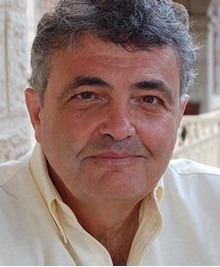
|
|
The historian Samuel Kassow will be the featured guest on the Yiddish Voice on April 25 2018 at 7:30 PM discussing his book Who Will Write Our History. The book tells the story of Emanuel Ringelblum and his team of historians who conspired to save a chronicle of life in the Warsaw Ghetto. Ringelblum and his fellow historians were nearly all murdered -- only three survived. Much of their archive was later recovered, and large amounts have been preserved, restored, and transcriptions and translations created from original Yiddish and Polish text sources. Kassow's book gives the reader an appreciation for the human side of the project to create the "Oyneg Shabes Archive", as these ill-fated conspirators code-named it. A new film based on Kassow's book with the same name, by director/producer Roberta Grossman and executive producer Nancy Spielberg, has recently been shown in pre-release versions in Los Angeles and Warsaw, Poland, and is expected to be released sometime in 2018. See the web site whowillwriteourhistory.com for information about the film.
SAMUEL KASSOW is the Charles H. Northam Professor of History at Trinity College, and is recognized as one of the world's leading scholars on the Holocaust and the Jews of Poland. Kassow was born in 1946 in a DP-camp in Stuttgart, Germany and grew up speaking Yiddish. Kassow attended the London School of Economics and Princeton University where he earned a PhD in 1976 with a study about students and professors in Tsarist Russia. He is widely known for his 2007 book Who Will Write Our History? Emanuel Ringelblum, the Warsaw Ghetto, and the Oyneg Shabes Archive (Indiana University Press).
Yom HaShoah: 75th Warsaw Ghetto Uprising Anniversary on the Yiddish Voice Apr 11 2018
(archived show here)Wednesday's broadcast of The Yiddish Voice (WUNR 1600-AM, Boston), Apr 11, 2018, at 7:30 PM, will feature an interview (in Yiddish) with be focus on the Warsaw Ghetto Uprising of April 1943, 75 years ago.
Highlights:
- Interview with Marek Edelman, who was the last commander of the Warsaw Ghetto Uprising to have lived, from 1996 is re-aired.
- Sholem Beinfeld, a regular contributor to the Yiddish Voice, co-Editor in Chief of the Comprehensive Yiddish-English Dictionary, and Professor of History, Emeritus, Washington University, St. Louis, discusses the Warsaw Ghetto Uprising generally as well as certain historical controversies.
- Mark (Motl) Murstein of Brookline, MA, originally from Poland, presents his own Yiddish translation of Zydom Polskim (Tsu Di Poylishe Yidn) by the late Polish poet Wladyslaw Broniewski, which was written in honor of the Warsaw Ghetto Uprising
- Leon Weinstein and Natalie Gold: a Jewish father who fought in the Warsaw Ghetto Uprising of '43 and Warsaw Uprising of '44 recalls reuniting with his infant daughter, who'd been hidden in a convent, after the war. At the time of the interview, in 1913, he was 100 years old, and he's since passed away. His daughter, Natalie Gold, works as a psychologist and is active in the survivor and Jewish community in Los Angeles.
Rav Kin on the Yiddish Voice March 28 2018
(archived show here)Wednesday's broadcast of The Yiddish Voice (WUNR 1600-AM, Boston), March 28, 2018, at 7:30 PM, will feature an interview (in Yiddish) with Rav Itzchak Kin of Los Angeles. Originally from Israel, Rabbi Kin talks about the holiday Pesach, and shares a nign from the vast musical repertoire Modzitzer Chassidim.
Cecille Kuznitz on the Yiddish Voice March 7 2018
(archived show here)Wednesday's broadcast of The Yiddish Voice (WUNR 1600-AM, Boston), March 7, 2018, at 7:30 PM, will feature an interview (in Yiddish) with Cecille Kuznitz, Assistant Professor of Jewish History and Director of Jewish Studies at Bard College.
In the interview Kuznitz discusses her book YIVO and the Making of Modern Jewish Culture: Scholarship for the Yiddish Nation (Cambridge University Press), the first history of the YIVO Insitute. Originally published in 2014, the book recently came out in a new softcover edition in 2017. Further publication info is available here: http://www.cambridge.org/gb/academic/subjects/history/twentieth-century-european-history/yivo-and-making-modern-jewish-culture-scholarship-yiddish-nation
http://www.cambridge.org/gb/academic/subjects/history/twentieth-century-european-history/yivo-and-making-modern-jewish-culture-scholarship-yiddish-nation
Zvi Gitelman on the Yiddish Voice Feb 7 2018 - Yiddish Voice Feb 7, 2018
(archived show here)This Wednesday's broadcast of The Yiddish Voice (WUNR 1600-AM, Boston), Feb 7, 2018, at 7:30 PM, will feature an interview (in Yiddish) with Zvi Gitelman, Professor of Political Science and Professor of Judaic Studies at the University of Michigan. Zvi Gitelman studies ethnicity and politics, especially in former Communist countries, as well as Israeli politics, East European politics, and Jewish political thought and behavior. His most recent edited book is The New Jewish Diaspora: Russian-speaking Immigrants in the United States, Israel and Germany (Rutgers University Press, 2016).
The interview is conducted by Sholem Beinfeld, a regular contributor to the Yiddish Voice, co-Editor in Chief of the Comprehensive Yiddish-English Dictionary, and Professor of History, Emeritus, Washington University, St. Louis.
The interview covers a range of topics, including the Soviet regime and the Holocaust; the role of Yiddish in various Soviet eras; and the situation of Russian Jews today, both in Russia and in other countries such as Israel, Germany, and the United States.
In Memory of Hasia Segal on Her First Yahrtzeit - Yiddish Voice Jan 3, 2018
(archived show here)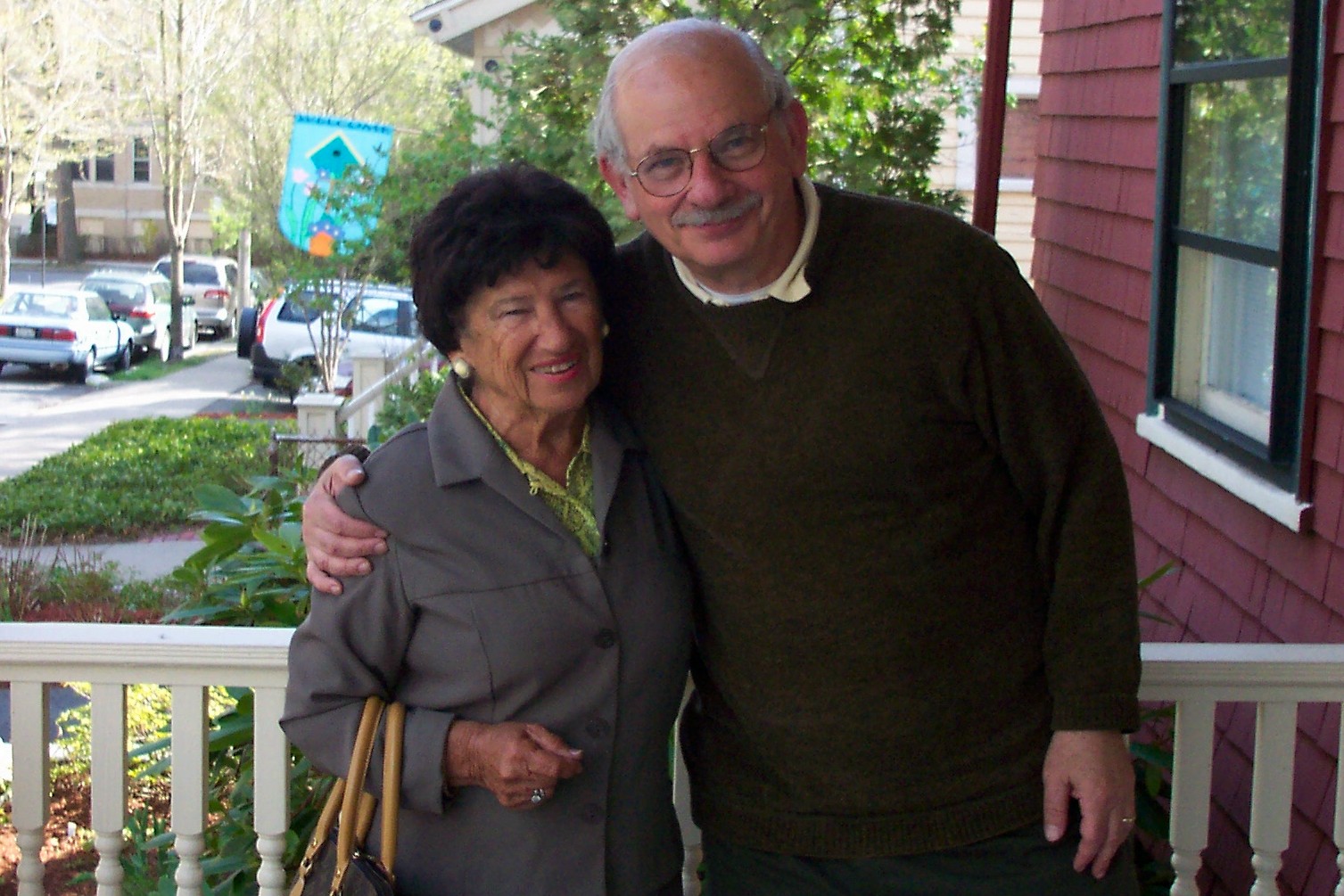 |
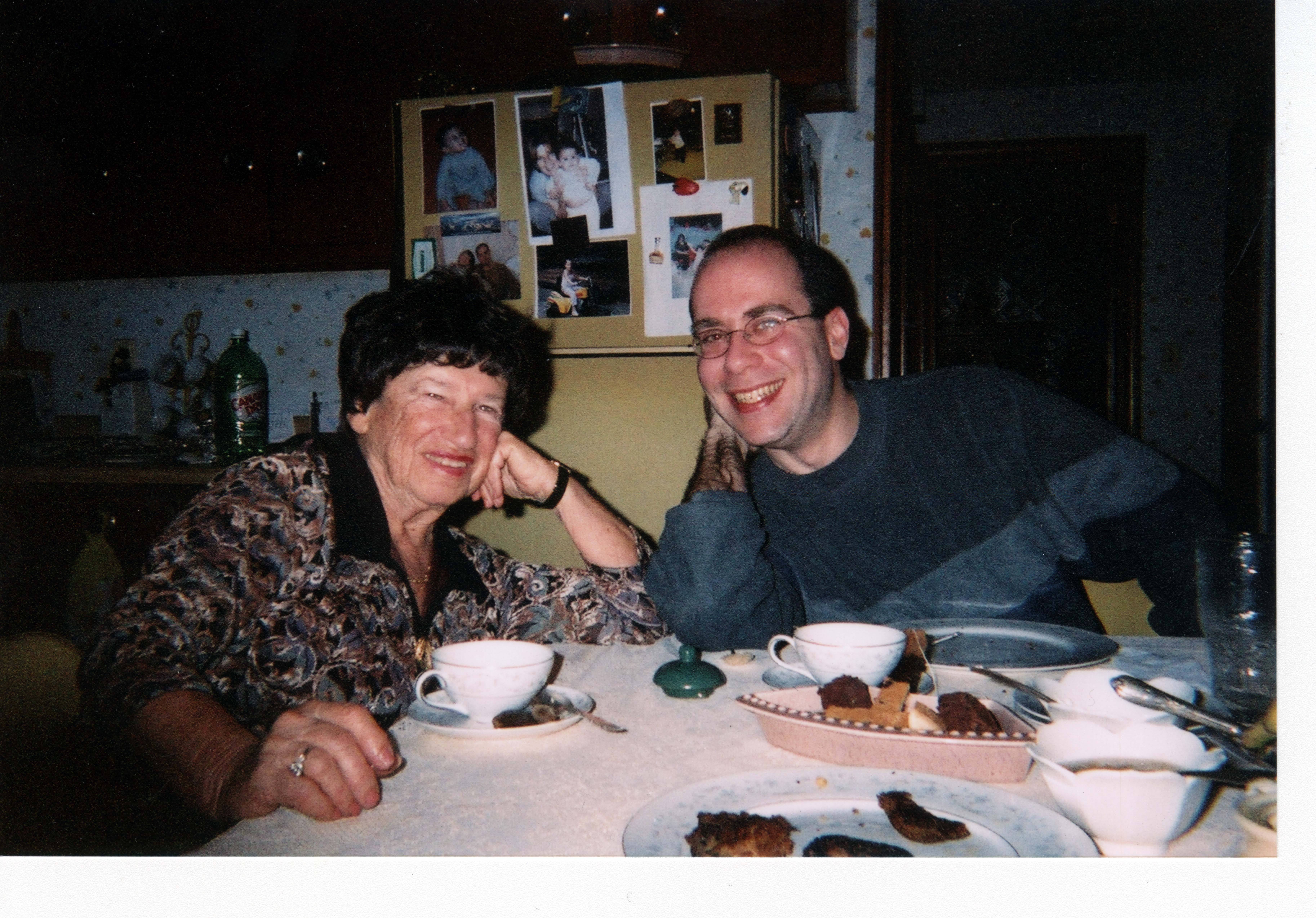 |
The Yiddish Voice tonight features a program in memory of Hasia Segal, the show's co-founder and co-host, a talented writer, interviewer, and presenter, whose first yahrtzeit falls this year on Saturday, Jan. 6, 2018. The show will feature words in memory of Hasia, some new and some from last year's Shloyshim memorial program, as well as archival recordings that include excerpts of Hasia's previously broadcast recordings.
The Yiddish Voice presented a Shloyshim Memorial radio program in memory of its late co-host Hasia Segal on Wednesday, Feb. 15, 2017 at 7:30 PM on WUNR 7:30 PM.
(archived show here)
Announcement date: January 18, 2017:
Hasia Segal z"l 1913 - 2017
חסיה סעגאַל 1913 - 2017
Photo: Hasia Segal in South Florida in February 2009.We are extremely saddened to announce that Hasia Segal died this past Monday night, January 16, 2017.
Hasia was a co-founder of the Yiddish-language radio show "The Yiddish Voice" (WUNR-1600AM, from 1994 to the present) and its predecessor "The Yiddish Hour" (WBRS-100.1FM, years 1990-1994).
Hasia (whose name you'll also find spelled Chasia, Chassia, or Khasye, and in English as Harriet), was the only child of Fayve (Shrage-Fayve) and Sheyne (Sheyne-Yente) Chernis. She was born in 1913 and was raised in Ponyevezh (Lithuanian: Panevezys), Lithuania, where she graduated the Tarbut Hebrew-language elementary school and Gimnasia Ivrit (Hebrew-language private high school). She then studied biology at the university of Kovne (Lithuanian: Kaunas; Russian: Kovno). In April of 1939, she, her late husband Elye (Eli) Segal of Vilkomir (now: Ukmerge, Lithuania), their infant daughter Ruth, and her parents moved to the United States, joining family that had clustered earlier in Greater Boston. A second daughter, Esther, was born within a few years. Hasia taught Yiddish at the Workmen's Circle school in Dorchester and worked as a Hebrew school teacher at Temple Emeth in Chestnut Hill (Brookline) for 35 years until her retirement. Throughout her years in Boston, she was a leading participant in local Yiddish radio and in Yiddish cultural organizations, in women's and general Zionist groups, and in Jewish and Hebrew education as a professional and as a continuing student herself at Boston Hebrew College. She was a celebrated performer at public events, including PBS's shows "Taste of Passover" and "Taste of Hanukkah," both alongside Theodore Bikel and recorded at the New England Conservatory. She graced the Greater Boston Area and Hyannis (Cape Cod) whenever gatherings of Yiddish and Hebrew speakers took place. And she provided selfless mentorship to younger people researching Yiddish civilization: the language, its arts and its folkways. She moved a few years ago to West Palm Beach where she continued to teach and entertain in retirement communities. Her endless knowledge, prodigious memory, and radiant personality dazzled all with whom she came into contact -- and her sense of humor knocked most people to the floor.
Hasia's funeral will take place on Sunday, January 22, at 10:00 AM at graveside at the Chevra Shas Cemetery off Baker Street in West Roxbury (address: 776 Baker St, Boston, MA 02132).
A Shloyshim memorial program on the Yiddish Voice is planned for Wednesday, Feb. 15, 2017.
The family requests that donations to honor Hasia's memory be sent to the "Yiddish Voice" radio show, of which Hasia was co-founder and co-host. The League for Yiddish, a 501(c)3 non-profit organization, has graciously agreed to accept such donations on behalf of the radio program if you send a check (in the memo line please write: "For Yiddish Voice Radio, in memory of Hasia Segal") to the following address:
League for Yiddish, Inc.
64 Fulton Street, Suite 1101
New York, NY 10038, USATo give online, go to www.leagueforyiddish.org, click the "DONATE NOW!" link, and fill out the form specifying the donation as supporting Yiddish Voice Radio in memory of Hasia Segal.
External related links:
- Local Yiddish radio show host, founder passes away at 103 -- article in the Jewish Advocate (Boston)
- Treasured Yiddish Activist Hasia Segal Has Passed Away -- article in Yiddish by the Forverts
- Harriet (Hasia) Segal's Oral History -- 2015 interview by the Yiddish Book Center's Wexler Oral History project
- HARRIET "CHASIA" (CHERNIS) SEGAL obituary -- online version of the obituary published in The Boston Globe on Jan. 20, 2017
- Youtube: Hasia Segal's Matzoh Ball Cooking Demonstration from VHS Tape: 'A Taste of Passover' (1999)
- See also: available on DVD: Hasia Segal's Latke Cooking Demonstration from DVD: 'A Taste of Chanukah' (1999)
Photo: Hasia Segal in her apartment in West Palm Beach, FL, in 2011.
